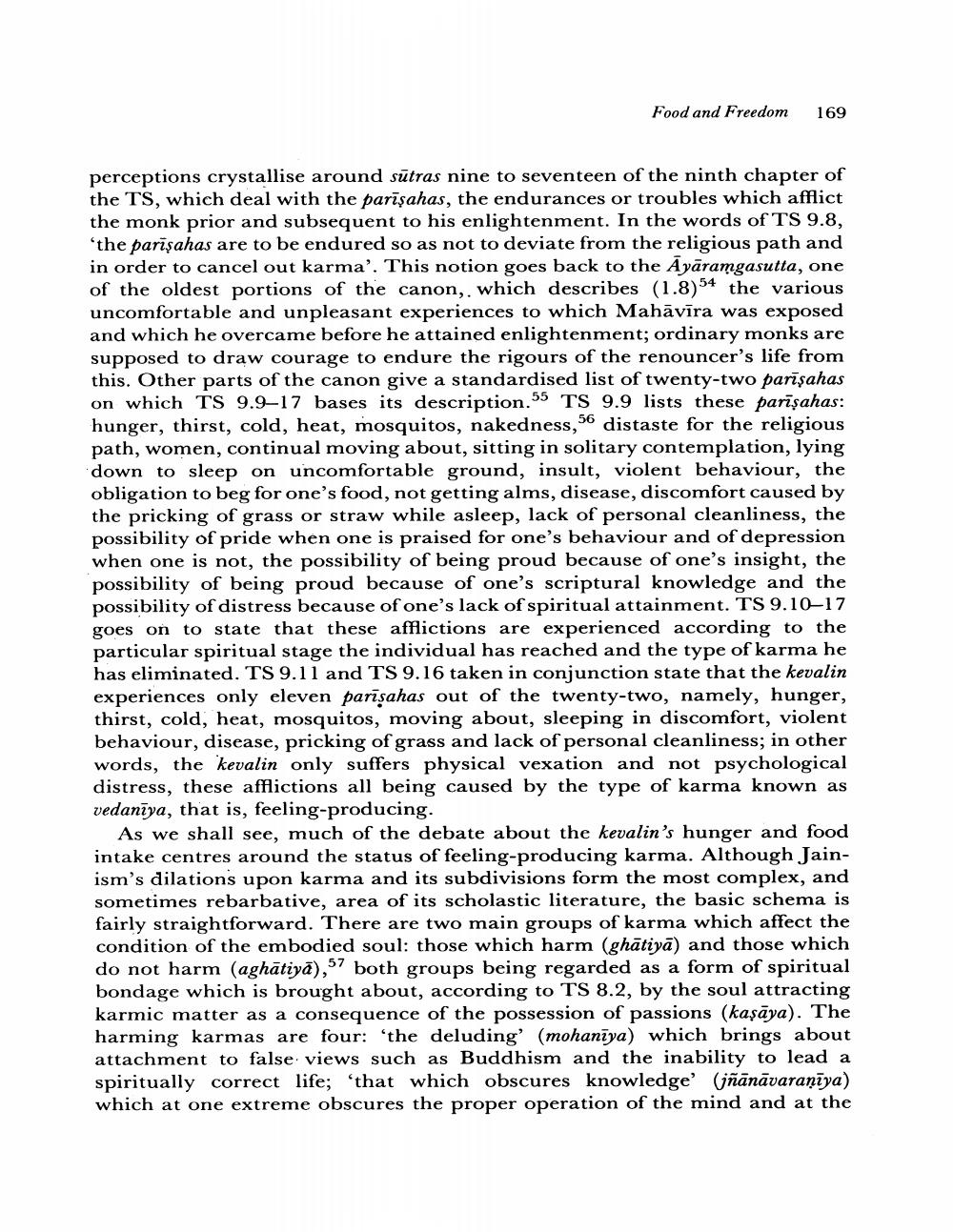Book Title: Food And Freedom Author(s): Paul Dundas Publisher: Paul Dundas View full book textPage 9
________________ Food and Freedom 169 perceptions crystallise around sūtras nine to seventeen of the ninth chapter of the TS, which deal with the parīşahas, the endurances or troubles which afflict the monk prior and subsequent to his enlightenment. In the words of TS 9.8, 'the parişahas are to be endured so as not to deviate from the religious path and in order to cancel out karma'. This notion goes back to the Ayāramgasutta, one of the oldest portions of the canon, which describes (1.8)54 the various uncomfortable and unpleasant experiences to which Mahāvīra was exposed and which he overcame before he attained enlightenment; ordinary monks are supposed to draw courage to endure the rigours of the renouncer's life from this. Other parts of the canon give a standardised list of twenty-two parīşahas on which TS 9.9–17 bases its description.55 TS 9.9 lists these parīşahas: hunger, thirst, cold, heat, mosquitos, nakedness, 56 distaste for the religious path, women, continual moving about, sitting in solitary contemplation, lying down to sleep on uncomfortable ground, insult, violent behaviour, the obligation to beg for one's food, not getting alms, disease, discomfort caused by the pricking of grass or straw while asleep, lack of personal cleanliness, the possibility of pride when one is praised for one's behaviour and of depression when one is not, the possibility of being proud because of one's insight, the possibility of being proud because of one's scriptural knowledge and the possibility of distress because of one's lack of spiritual attainment. TS 9.10-17 goes on to state that these afflictions are experienced according to the particular spiritual stage the individual has reached and the type of karma he has eliminated. TS 9.11 and TS 9.16 taken in conjunction state that the kevalin experiences only eleven parāsahas out of the twenty-two, namely, hunger, thirst, cold, heat, mosquitos, moving about, sleeping in discomfort, violent behaviour, disease, pricking of grass and lack of personal cleanliness; in other words, the kevalin only suffers physical vexation and not psychological distress, these afflictions all being caused by the type of karma known as vedanīya, that is, feeling-producing. As we shall see, much of the debate about the kevalin's hunger and food intake centres around the status of feeling-producing karma. Although Jainism's dilations upon karma and its subdivisions form the most complex, and sometimes rebarbative, area of its scholastic literature, the basic schema is fairly straightforward. There are two main groups of karma which affect the condition of the embodied soul: those which harm (ghātiyā) and those which do not harm (aghātiyā),57 both groups being regarded as a form of spiritual bondage which is brought about, according to TS 8.2, by the soul attracting karmic matter as a consequence of the possession of passions (kaşāya). The harming karmas are four: 'the deluding' (mohanīya) which brings about attachment to false views such as Buddhism and the inability to lead a spiritually correct life; that which obscures knowledge' (jñānāvaranīya) which at one extreme obscures the proper operation of the mind and at thePage Navigation
1 ... 7 8 9 10 11 12 13 14 15 16 17 18 19 20 21 22 23 24 25 26 27 28 29 30 31 32 33 34 35 36 37
